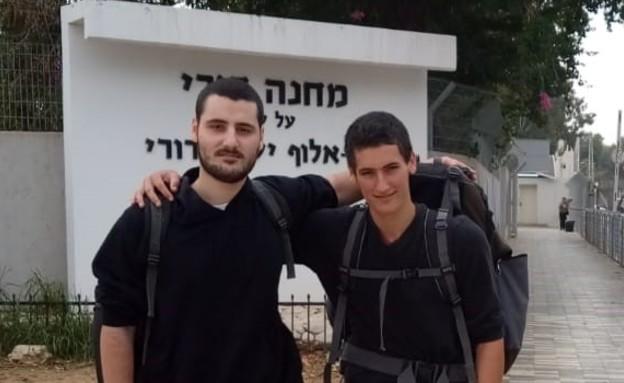by RORY FANNING

Hilel Garmi’s phone is going straight to voicemail and all I’m hoping is that he’s not back in prison. I’ll soon learn that he is.
Prison 6 is a military prison. It’s situated in the Israeli coastal town of Atlit, a short walk from the Mediterranean Sea and less than an hour’s drive from Hilel’s home. It was constructed in 1957 following the Sinai War between Israel and Egypt to house disciplinary cases from the Israeli Defense Forces, or IDF.
Hilel has already been locked up six times. “I can smell the sea from my cell, especially at night when everything is quiet,” he tells me in one of our phone conversations. I’m 6,000 miles away in Chicago, but Hilel and I have regularly been discussing his ordeal as an Israeli war resister, so it makes me nervous that, this time around, I can’t reach him at all.
A recent high-school graduate with dark hair and a big smile, he’s only 19 and still lives with his parents in Yodfat, an Israeli town of less than 900 people in the northern part of the country. It’s 155 miles to Damascus (if such a trip were possible, which, of course, it isn’t), a two-hour drive down the coast to Tel Aviv, and a four-hour drive to besieged Gaza.
Yodfat itself could be a set for a Biblical movie, with its dry rolling hills, ancient ruins, and pastoral landscape. The town exports flower bulbs, as well as organic goat cheese, and notably supports the Misgav Waldorf School that Hilel’s mother helped found. Hilel is proud of his mom. After all, people commute from all over Israel to attend the school.
He is a rarity in his own land, one of only a handful of refuseniks living in Israel. Each year roughly 30,000 18 year olds are drafted into the IDF, although 35% of such draftees manage to avoid military service for religious reasons. A far tinier percentage publicly refuses to fight for moral and political reasons to protest their country’s occupation of Palestinian lands. The exact numbers are hard to find. I’ve asked war resister groups in Israel, but no one seems to have any. Hilel’s estimate: between five and 15 refuseniks a year.
“I’ve thought the occupation of Palestine was immoral at least since I was in eighth grade,” he told me. “But it was the March of Return that played a large role in sustaining the courage to say no to military service.”
The Great March of Return began in the besieged Gaza Strip on March 30, 2018, the 42nd anniversary of the day in 1976 that Israeli police shot and killed six Palestinian citizens of Israel as they protested the government’s expropriation of land. During the six-month protest movement that followed in 2018, Israeli soldiers killed another 141 demonstrators, while nearly 10,000 were injured, including 919 children, all shot.
“I couldn’t be a part of that,” he said. “I’d rather be in jail.”
However, after 37 days in prison, it was the letter Hilel received from Abu Artema, a key Palestinian organizer of that march, which provided him with his greatest inspiration. It read in part:
“Your decision is what will help end this dark period inflicted on Palestinians, and at the same time mitigate the fears of younger Israeli generations who were born into a complicated situation and a turbulent geographical area deprived of security and peace… I believe the solution is near and possible. It will not require more than the courage to take initiative and set a new perspective, after traditional solutions have failed to achieve a just settlement. Let us fight together for human rights, for a country that is democratic for all its citizens, and for Israelis and Palestinians to live together based on citizenship and equality, not segregation and racism.”
“This letter excited me a great deal,” Hilel said. “It’s Palestinians like Artema who have the true courage, the kind that can only come from the moral authority of those resisting occupation and violent oppression. This type of authority is much stronger than the forces that occupy Palestine.”
After trying yet again to reach him by phone, I send Hilel a Facebook message:
“I hope everything is all right. Call me when you can. By the way, I was listening to this song and it reminded me of you. Stay strong, brother.”
I attach a YouTube video of “The World’s Greatest” by Bonnie “Prince” Billy:
I’m that little bit of hope
With my back against the ropes.
I can feel it
I’m the world’s greatest…”
War resister to war resister
As a war resister myself while serving in the U.S. Army — I was protesting America’s unending wars across the Greater Middle East — I’ve wondered a lot about what it means to be one in Israel, a country where an antiwar movement is almost non-existent. My friends in the U.S. who are familiar with the militarization of Israel and the population’s overwhelming support for their country’s still-expanding occupation respect what Hilel is doing, but wonder about the political purpose of an essay like this one about a war resister who lives in a country where such creatures are rarer than a snowy day in Jerusalem.
Towards Freedom for more
